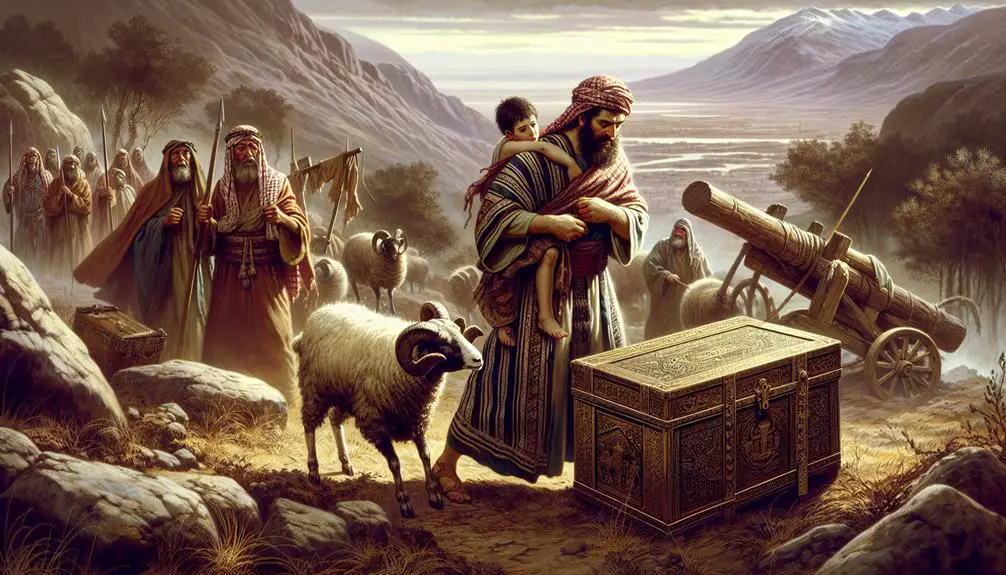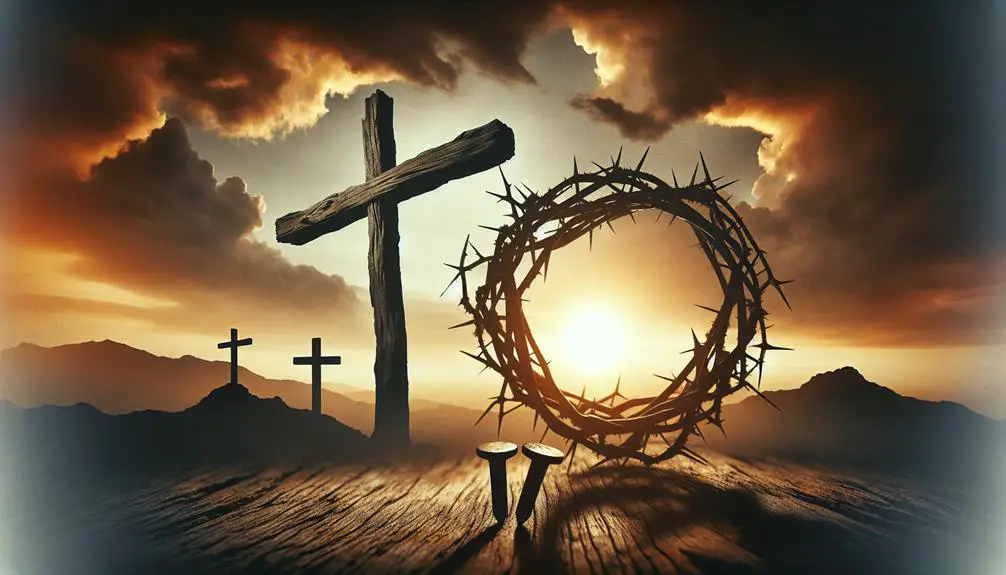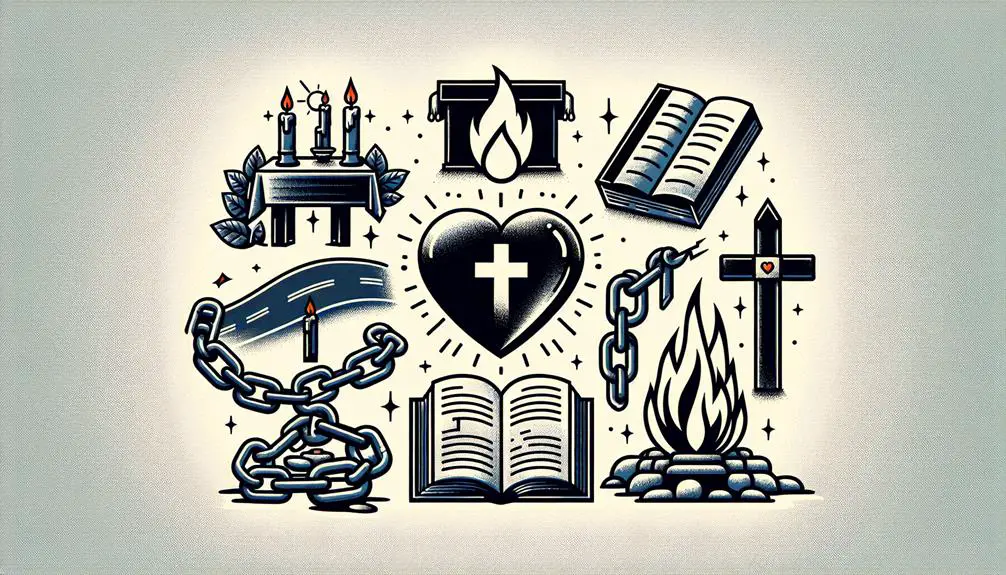Kneel into the biblical world of sacrifice, from Abraham to Christ, and discover the profound lessons hidden in these acts of faith.

Examples of Sacrifices in the Bible
Did you know that the Bible mentions the word 'sacrifice' over 200 times?
This staggering figure underscores the pivotal role sacrifices play in biblical narratives, reflecting themes of obedience, devotion, and redemption.
From Abraham's test of faith to the ultimate sacrifice of Jesus Christ, these stories weave a complex tapestry of faith and moral lessons.
As you ponder the significance of these acts, you might find yourself questioning the nature of sacrifice and its relevance today.
Let's embark on a journey through these ancient texts, uncovering the layers of meaning behind each act of surrender.
Key Takeaways
- The Passover lamb symbolizes purity and deliverance, embodying God's provision and covenant with His people.
- Abraham's willingness to sacrifice Isaac reflects deep faith and obedience to divine commands, highlighting ethical dilemmas of faith.
- Jesus Christ's crucifixion serves as the ultimate sacrifice, signifying redemptive suffering and unconditional love for humanity.
- Paul's concept of a living sacrifice emphasizes continuous devotion and spiritual worship through daily life actions and embodying faith principles.
Abraham's Test of Faith

In examining Abraham's test of faith, we observe a profound moment of obedience and trust in divine command, as he prepares to sacrifice his son, Isaac, at God's behest. This narrative, rich with ethical dilemmas, unfolds on Mount Moriah, a locale laden with future significance in biblical tradition. You're drawn into a contemplation of the weight of faith and the complexities of divine-human interaction.
The significance of Mount Moriah can't be understated; it symbolizes the juncture of absolute faith and divine promise, serving as the backdrop for a test that transcends mere personal trial to become a foundational episode in the faith of generations.
The ethical dilemmas presented in Abraham's test are manifold. You're compelled to grapple with the tension between divine command and moral instinct, a dilemma that has perplexed scholars and believers alike. This story challenges you to consider the limits of obedience to divine will, inviting a deeper inquiry into the nature of faith itself. Abraham's unwavering trust in God, despite the incomprehensible demand placed upon him, offers a profound reflection on the essence of true faith and obedience.
The Passover Lamb

As you explore the profound narrative of the Passover Lamb, you encounter a rich tapestry of symbolism, deeply rooted in the origins of the Passover ritual.
This emblematic lamb not only signifies purity and innocence but also embodies the principle of protection through obedience to divine commandments.
The analysis of these elements reveals the layered significance of the Passover Lamb in both historical and theological contexts, inviting a deeper appreciation of its role in the narrative of sacrifice and redemption.
Symbolism of the Lamb
Throughout the narrative of the Passover, the lamb symbolizes deliverance and sacrifice, serving as a poignant emblem of God's provision for His people. The lamb's innocence and sacrificial purity are central themes, underscoring the depth of the sacrifice made.
Consider the symbolism:
- Lamb's Innocence: Reflects the sinlessness required for redemption.
- Sacrificial Purity: Emphasizes the need for a faultless offering.
- Deliverance: The lamb as a means of salvation from judgment.
- Provision: Signifies God's provision of a substitute for our penalty.
- Covenant: Represents the establishment of a relationship between God and His people through sacrifice.
This symbolism, steeped in reverence and sacrifice, offers a profound understanding of God's salvation plan, highlighting the lamb's pivotal role in divine redemption.
Passover Ritual Origins
Building on the profound symbolism of the lamb, let's explore the Passover ritual origins and the critical role of the Passover Lamb in this sacred tradition. The Passover commemorates the Israelites' liberation from Egypt, marked by the tenth and most devastating of the Egyptian plagues – the death of the firstborn. In this moment, the lamb transcends its initial representation, becoming a symbol of salvation and divine mercy.
Aspect |
Emotional Resonance |
|---|---|
Lamb's Sacrifice |
Deep sorrow and reverence |
Deliverance |
Overwhelming gratitude |
Egyptian Plagues |
Sobering awe |
Feast Significance |
Profound communal connection |
The Feast significance cannot be overstated; it's a time-honored reminder of deliverance and divine protection, deeply rooted in the collective memory and spiritual identity of the people.
Protection Through Obedience
In the context of the Passover Lamb, every act of obedience significantly contributed to the protection of the Israelites from the final devastating plague. This narrative underscores how obedience rewards those who display covenant loyalty, highlighting a profound spiritual principle.
- *Selecting a flawless lamb*: Demonstrates meticulous adherence to divine instructions.
- *Applying the blood to doorposts*: Symbolizes the protective power of faith and obedience.
- *Eating the lamb with bitter herbs and unleavened bread*: Encapsulates the readiness for deliverance.
- *Staying indoors*: Illustrates trust in God's provision for safety.
- *Disposing of leftovers by morning*: Ensures complete reliance on God's provision for the future.
These acts of obedience weren't just ritualistic observances but were imbued with deep symbolic significance, reinforcing the importance of covenant loyalty and the rewards of obedience.
Jephthah's Vow

CURRENT SUBTOPIC: 'Jephthah's Vow'
One of the most controversial narratives in the Bible involves Jephthah's vow to God, wherein he promises to sacrifice the first thing that greets him upon his victorious return, leading to unforeseen consequences. This tale, deeply embedded in ancient cultural norms, starkly highlights the tragic outcome of impulsive promises to the divine. It's a story that compels you to ponder the weight of words and the depths of devotion.
Aspect |
Details |
|---|---|
Context |
Judges 11; Israelite leader's rash vow |
Main Figure |
Jephthah, a judge of Israel |
Daughter's Fate |
The unintended sacrifice; embodies tragic loyalty |
Cultural Norms |
Reflects ancient values of honor and sacrifice |
Jephthah's story serves as a cautionary tale about the dangers of making vows without foreseeing their potential impact, especially when they involve significant others. His daughter's fate, particularly, underscores the complexities of familial bonds and cultural expectations in biblical times. This narrative invites you to reflect on the nature of promises and the profound implications they can have on the lives of individuals and their communities.
Hannah's Promise

Shifting focus to another profound narrative, we encounter Hannah's promise, a vow that intertwines despair with divine intervention, shaping a legacy within the tapestry of biblical history. This story unfolds with Hannah's prayer, a poignant plea for a child, expressed with such fervor that it catches the attention of Eli, the priest.
Hannah's promise to God, if He were to grant her a son, wasn't made lightly. It was a sacrifice of what she desired most, offered back to the Divine in gratitude and service. This narrative teaches us about:
- The depth of Hannah's despair and her unwavering faith.
- The significance of Eli's role, serving as both witness and interpreter of her vow.
- The power of prayer, demonstrating that heartfelt pleas can indeed move the heavens.
- The concept of a vow as a sacred commitment, not just a desperate bargain.
- The ripple effect of Hannah's promise, affecting not just her life but the course of biblical history through her son, Samuel.
Analyzing Hannah's story, you're invited to reflect on the nature of true sacrifice—giving up something profoundly cherished for a cause or a belief far greater than personal desire.
The Sacrifice of Isaac

You'll find the narrative of Isaac's near-sacrifice as a profound testament to faith and obedience within the biblical canon.
This episode not only showcases God's test of Abraham's faith but also highlights Isaac's trust and compliance amidst a perplexing demand.
Analyzing this story allows us to explore the complexities of divine tests and human response in sacred texts.
God's Test of Faith
One of the most profound tests of faith recorded in the Bible is when God asked Abraham to sacrifice his son Isaac. This narrative isn't just a historical account; it serves as a touchstone for understanding the evolution of faith and its modern parallels.
Consider these aspects:
- Faith's Evolution: How individuals' understanding of faith has broadened over centuries.
- Modern Parallels: Current situations that challenge one's faith in profound ways.
- Obedience: Abraham's willingness to obey, despite the personal cost.
- Divine Intervention: The moment God stops Abraham, highlighting mercy.
- Legacy: The impact of this story on generations of believers.
Analyzing this event encourages you to reflect on the nature of faith, obedience, and divine guidance in your life.
Isaac's Compliance and Trust
Reflecting on Abraham's profound test of faith leads us naturally to consider Isaac's role, marked by his compliance and trust during the sacrificial episode. This narrative not only presents a profound parental dilemma but also delves into the ethical implications of absolute obedience to divine command.
You see, Isaac's willingness to be the sacrificial lamb underscores a deep-seated faith not just in his father but in the divine will itself. His compliance doesn't denote passivity; rather, it symbolizes an active participation in a faith-testing process. This story, therefore, isn't solely about Abraham's faith; it's equally about Isaac's trust.
Through Isaac, you encounter a dimension of faith that intertwines with obedience, raising pivotal questions about the nature of belief and submission to the divine will.
Jesus Christ's Crucifixion

The crucifixion of Jesus Christ stands as a pivotal event in Christian theology, embodying the ultimate sacrifice for humanity's sins. This moment, marked by redemptive suffering, isn't just a theological cornerstone but also a historical crucifixion that has been analyzed and revered across generations. Your understanding of this sacrifice brings into focus the depth of love and commitment shown by Jesus for mankind.
Consider these aspects of Jesus's crucifixion:
- Historical Context: Jesus's crucifixion occurred under Roman governance, exemplifying the brutal methods of execution used during that era.
- Spiritual Significance: This act wasn't merely a historical event but a fulfillment of Old Testament prophecies, signifying the ultimate sacrifice for the atonement of humanity's sins.
- Redemptive Suffering: Jesus's pain and suffering were undertaken willingly, to open the way for salvation for all who believe in Him.
- Unconditional Love: The crucifixion is a testament to the boundless love Jesus holds for humanity, willing to endure the utmost for our redemption.
- Eternal Impact: The effects of this sacrifice resonate through time, offering hope and a path to reconciliation with God.
This sacrifice, unparalleled in history, invites you to reflect on the profound love and mercy shown through Jesus's crucifixion.
Paul's Living Sacrifice

Exploring Paul's concept of a living sacrifice unveils a transformative approach to worship, urging believers to offer their lives as a continuous act of devotion to God. This paradigm, deeply rooted in Paul's ministry, emphasizes spiritual worship not confined to acts of ritual sacrifice but extended to daily life and behavior. You're invited to see your existence as an ongoing offering to the Divine, where decisions, actions, and thoughts become sacred contributions to a life of faith.
Paul's teachings encourage you to embrace a holistic form of worship, where spiritual worship transcends traditional boundaries, highlighting the significance of embodying the principles of faith in every aspect of life. This approach suggests that the essence of true worship lies in the dedication of one's life to reflecting God's love and commandments. You're called to consider how your daily interactions, work, and even struggles can be consecrated as acts of worship, aligning your entire being with divine purpose.
Frequently Asked Questions
How Do Modern Theologians Reconcile the Concept of Human and Animal Sacrifices in the Bible With Contemporary Ethical Standards?
You're delving into how modern theologians bridge ancient practices with today's ethics. They see ethical evolution as key, suggesting our moral compass has expanded. Through theological adaptation, they reinterpret these sacrifices metaphorically, aligning them with principles of selflessness and devotion rather than literal acts.
This approach respects historical context while adhering to contemporary moral standards, showcasing a reverence for the past and a commitment to ethical progress.
What Are the Psychological Impacts on Biblical Characters Who Made Significant Sacrifices, and How Does This Reflect on Modern Understandings of Trauma and Recovery?
You're exploring the psychological impact of significant sacrifices on biblical characters, shedding light on modern interpretations of trauma and recovery. This analysis reveals how these narratives can inform our understanding of trauma healing and emotional resilience.
By examining these ancient texts, we gain insight into the enduring human capacity for resilience in the face of adversity.
This scholarly approach offers a reverent appreciation of these stories, enriching our comprehension of both historical and contemporary experiences of trauma.
In What Ways Have the Stories of Sacrifices in the Bible Influenced the Development of Christian Liturgical Practices, Especially in Relation to the Eucharist?
You'll find that Christian liturgical practices, especially concerning the Eucharist, deeply intertwine with biblical stories of sacrifice. These narratives have shaped the use of liturgical colors and the timing of Feast days, reflecting a profound reverence for these events.
The Eucharist itself is a direct response, embodying the ultimate sacrifice. This connection not only enriches the worship experience but also offers a tangible link to the foundational sacrifices of faith.
How Do Different Christian Denominations Interpret the Necessity and Symbolism of Jesus Christ's Crucifixion Differently, Especially in the Context of Salvation and Atonement?
You're delving into how Christian denominations diverge in interpreting Jesus Christ's crucifixion, particularly regarding salvation and atonement. This exploration reveals significant denominational divisions, each with unique Eucharistic interpretations. These perspectives shape their understanding of Christ's sacrifice's necessity and symbolism, influencing worship and theology profoundly.
Your analysis highlights the complex interplay between theological beliefs and liturgical practices, underscoring the diversity within Christianity's approach to its central tenets.
Can Parallels Be Drawn Between the Sacrificial Themes in the Bible and Similar Concepts Found in Other Major World Religions, and What Might These Parallels Tell Us About the Universal Human Experience?
You'll find that across major world religions, sacrificial themes echo profoundly, hinting at cultural syncretism and mythological parallels.
These common threads suggest a universal human inclination towards rituals of sacrifice, underscoring a shared quest for atonement, renewal, and divine connection.
Analyzing these parallels offers insightful reflections on humanity's spiritual journey, revealing deep-rooted beliefs in the power of sacrifice to transcend the mundane and touch the divine, uniting us in our spiritual endeavors.
Conclusion
In conclusion, you've journeyed through a labyrinth of profound sacrifices in the Bible, each shedding light on the multifaceted essence of faith and devotion.
From Abraham's unwavering obedience to Jesus Christ's ultimate sacrifice, these narratives underscore a pivotal truth: true faith often requires us to lay our most cherished treasures on the altar.
As you reflect on these stories, remember that in the tapestry of faith, every thread of sacrifice weaves a broader picture of divine purpose and human redemption.



Sign up